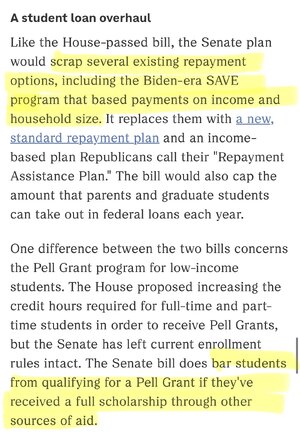- Messages
- 21,628
“… The bill would also force states to take on a greater share of the cost of providing food assistance. The amount a state owes would be based on a formula set by the percentage of erroneous payments reported each year. Those changes would go into effect in 2028. [I read elsewhere there is a waiver of this for states not in the co rigorous United States — the Murkowski vote concession as Alaska apparently has one of the highest error rates in the country]“… The Senate's text includes temporary changes that would allow Americans to deduct up to $25,000 for tip wages and $12,500 for overtime pay through 2028. The Senate version also says that overtime and tip deductions will be reduced for Americans with incomes higher than $150,000. Those limits were not included in the House version.
The Senate bill also increases the child tax credit from $2,000 to $2,200 per child and adjusts the amount for inflation after 2025. It's slightly different than the House plan to temporarily increase the credit to $2,500 before cutting it back to the current level and adjusting for inflation.
In addition, the Senate text would permanently expand the standard deduction, marking a key difference from the House bill, which temporarily expands it through 2028. Senators also boosted a tax deduction for people over 65 to $6,000 through 2028, compared to $4,000 in the House bill. Both chambers included a phase out for people earning over $75,000.…”
… The Senate plan would temporarily lift the [SALT] cap to $40,000 for married couples with incomes up to $500,000. But that provision would expire after 2028 — an effort to buoy the blue-state Republicans through the 2026 midterm and 2028 election cycles, while limiting the long-term impact of the cuts on federal tax revenue.
… The Senate plan would require able bodied adults to work 80 hours per month until age 65 to qualify for benefits. There are carveouts for parents of children under 14 and those with disabilities.
The plan would also cap and gradually reduce the tax states can impose on Medicaid providers. The phase out would begin in 2028, ultimately ending in a 3.5 percent cap on that tax. Several GOP senators have raised concerns that the tax is a critical funding stream for rural hospitals in particular — which could close if that income stream dries up.
In an effort to alleviate some of those concerns, Senate GOP leaders included a new $25 billion fund to support rural hospitals. That program would also begin in 2028 and funds would be spread out over five years…”






